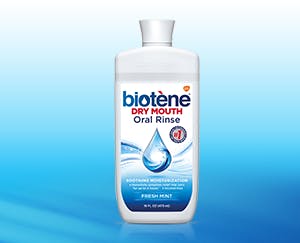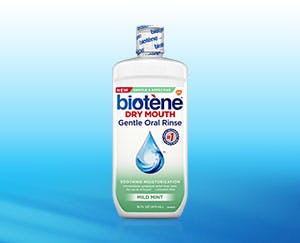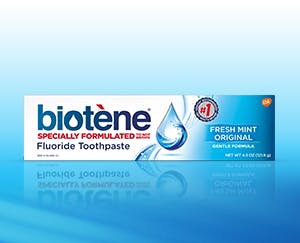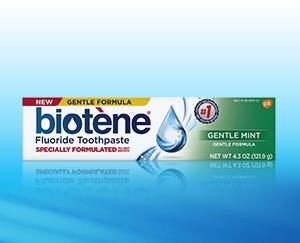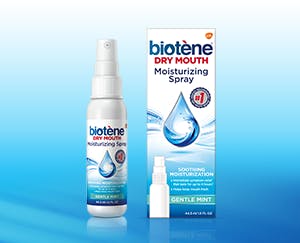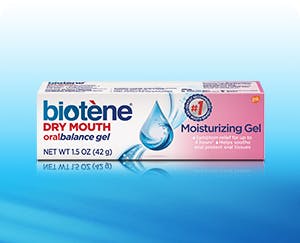Perhaps you’ve occasionally noticed a dryness or feeling of stickiness in your mouth. This is a condition called xerostomia, more commonly known as dry mouth.1 It occurs when the salivary glands fail to generate enough saliva to keep your mouth wet.1
Everyday Medications Can Cause DRY MOUTH
Dry mouth can be a side effect of hundreds of medications, including over-the-counter and commonly prescribed medications.2 Some of the most common medications that can cause dry mouth include:
- Antidepressants: especially with Selective Serotonin Reuptake Inhibitors (SSRIs).3
- Decongestants: OTC medicines, especially those containing pseudoephedrine4
- Antihistamines: allergy and cold symptom medications such as diphenhydramine5
- Muscle relaxants: medications prescribed to treat stiffness, and discomfort, including cyclobenzaprine and tizanidine6,7
- Antihypertensive drugs: medications prescribed to help treat high blood pressure or hypertension8
Consult with your physician or healthcare provider before discontinuing the medications prescribed.
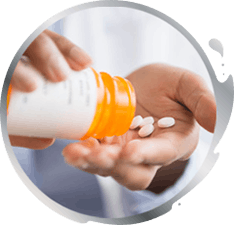
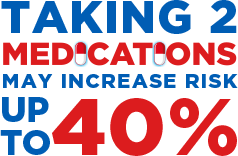
Medical Treatments & Therapies Can Also Cause Dry Mouth
Dry mouth can be a common side effect of various medical treatments. If you're being treated for head and neck cancer, chemotherapy or head and neck radiation, these treatments could lead to dry mouth.2 You may also experience dry mouth if you’re being treated for an overactive bladder, especially with oxybutynin.9 Treatments for health conditions such as diabetes or autoimmune diseases like HIV/AIDS could also be causing your body not to make enough saliva.10,11
Speak with your doctor, dental professional or pharmacist if dry mouth symptoms are an uncomfortable side effect of your medications.*
Is Medication Causing Your Dry Mouth?
Try Biotène® Dry Mouth Oral Rinse to help relieve your dry mouth symptoms and regularly schedule an appointment to see your dentist as part of a good oral care routine. Learn more about living with dry mouth and discover how to help manage dry mouth symptoms at night and ways to help manage it at work and in other situations.
*Check with your provider before discontinuing medications.
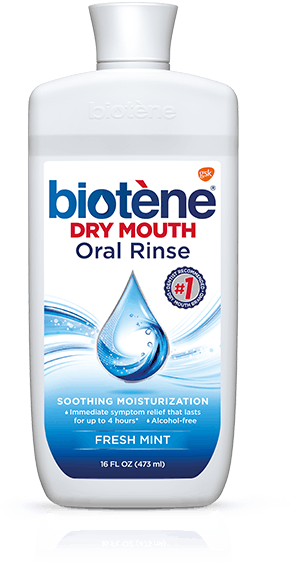
Source Citations:
- Dry Mouth. Mayo Clinic. https://www.mayoclinic.org/diseases-conditions/dry-mouth/symptoms-causes/syc-20356048/. Accessed 4/23/2024.
- Dry Mouth (Xerostomia). Cleveland Clinic. https://my.clevelandclinic.org/health/diseases/10902-dry-mouth-xerostomia/. Accessed 4/23/2024.
- Meta-analysis: Risk of dry mouth with second generation antidepressants. National Library of Medicine. https://pubmed.ncbi.nlm.nih.gov/29274375/. Accessed 4/23/2024.
- Side effects of pseudoephedrine. NHS. https://www.nhs.uk/medicines/pseudoephedrine/side-effects-of-pseudoephedrine/. Accessed 4/23/2024.
- Antihistamines. Cleveland Clinic. https://my.clevelandclinic.org/health/drugs/21223-antihistamines/. Accessed 4/23/2024.
- Cyclobenzaprine (Oral Route). Mayo Clinic. https://www.mayoclinic.org/drugs-supplements/cyclobenzaprine-oral-route/description/drg-20063236?p=1/. Accessed 4/23/2024.
- Tizanidine (Oral Route). Mayo Clinic. https://www.mayoclinic.org/drugs-supplements/tizanidine-oral-route/side-effects/DRG-20066921?p=1/. Accessed 4/23/2024.
- Blood Pressure Medication. Cleveland Clinic. https://my.clevelandclinic.org/health/treatments/21811-antihypertensives/. Accessed 4/23/2024.
- The newer antimuscarinic drugs: Bladder control with less dry mouth. Cleveland Clinic Journal of Medicine. https://www.ccjm.org/content/ccjom/69/10/761.full.pdf/. Accessed 4/23/2024.
- Diabetes and Oral Health. Centers for Disease Control and Prevention. https://www.cdc.gov/diabetes/managing/diabetes-oral-health.html/. Accessed 4/23/2024.
- Oral Health for People With HIV. Health Resources and Services Administration. https://www.hrsa.gov/oral-health/people-with-hiv/. Accessed 4/23/2024.



